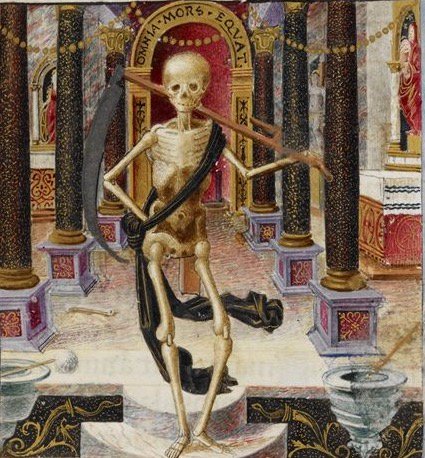I encountered this magnificent tarot deck when I was excavating the many layers of Sons of Perdition's third album "Trinity", read more here (opens in a new window). It's called the Rider-Waite tarot deck. The amazing cards were drawn by illustrator Pamela Colman Smith from the instructions of A. E. Waite and published by the Rider Company, read more here (opens in a new window). The tarot deck was originally published in 1910. It wasn't really surprising to find a reference to tarot on Trinity. There are numbers and symbols everywhere on the album. In the physical release of Trinity an exclusive tarot card was included, "The Fool" by artist, illustrator, cartoonist and letterer Christoph Mueller. The Mueller card differs from the frivolous and unconcerned fool in the Rider-Waite deck (who is just about to step over a cliff). The Muller fool is frantic and uncontrollable, check it out here (opens in a new window). It can easily be explained. "Trinity tells the story of a fool’s hellish journey through the blood-soaked deserts of the American Southwest through religious, occult, and alchemical allusions". There are 78 cards in a tarot deck and 22 of them constitutes the so-called Major Arcana (picture cards that serve as a permanent trumps). The Major Arcana begins with "The Fool" (no. 0) and ends with "The World" (no. 21). Well, it doesn't really end. It begins again like an ouroboros. The 22 cards in the Major Arcana are displayed one by one in the image carousel to the left. To mention a few of the highlights in the Rider-Waite deck: "The Fool" (no. 0), "The Empress" (no. 3), "The Lovers" (no. 6), "The Hermit" (no. 9), "The Hanged Man" (no. 12), "Death" (no. 13), "The Tower" (no. 16), "The Sun" (no. 19) and "Judgement" (no. 20). My personal favorite is "The Magician" (no. 1). Tarot iconography has The Magician’s right hand pointing toward the heavens while his left points to the earth, showing his ability to connect the two. In numerology, every number is significant, yet there are three numbers which have special characteristics: 11, 22 and 33. These are the "master numbers". Twenty-two represents the ultimate capacity to make dreams into reality. There are references to 22 on Trinity. In the opening song, "Fallout", there's a line "Twenty-two is the crown". Tarot divination says nothing to me about my life. For my part, I only appreciate the aestetic qualities. Still, twenty-two is the crown. No doubt about it.


I've been pre-listening to the upcoming album for a couple of weeks, but I got stuck on the opening song. All T.K. Bollinger albums begins with a strong opener. This album is no exception. The first song is "Living God" and deals with the ambivalent feeling of loss of waking up from a beautiful dream. "Such dream have a cost / When awake you feel the loss / Since that time I live in hope to find / Paying the price to the living God". The vocals and the instruments are in perfect harmony. The introduction to the album is so epic that for a moment I worry that T.K. Bollinger has burnt everything he got in the opening song. Fortunately, this isn't the case here. So far, so good. However, the shift in style in the second song "Now Or Never" couldn't be greater. It's a funky song, almost dance groove music. It deals, as I understand it, with the long-awaited breakthrough that is bound to happen (any day now). "You may have forgot your self respect / That's not something I'd give up / Not Now or never". The third song "Colour By Numbers" is haunting and deals with what you expect and what you get from life, which is an universal theme. I especially like the chorus: "It's there any wonder we no longer get along? / We coloured love by numbers and got the palate wrong". The arrangement is sparse and built around the vocals. The fourth song "Lurking (Help Me Through The Day)" deals with what helps us make it through the day (not the night, that's another song by Kris Kristofferson). The first line [not shown in the lyrics] is "You help me make it through the day" sounds like it's sung through a vocoder (a category of voice codec that analyzes and synthesizes the human voice signal). This song doesn't belong to the strongest on the album. At this point, I'm beginning to wonder where all this is going. The shift in style isn't drastic, but distinct.

Now the album ratches up a few notches. The fifth song is "Compassion Fatigue”, which deals with the flame that drives us and what happens when the flame dies. The song is magnificient and built up around restrained vocals and sparse arrangements including, for the genre, extremely unorthodox drumming. The song ends after a long instrumental sequence that eventually fades out. The lyrics are well-written: "Now the flame is gone / And ever song that's sung / Sounds the same / Like we're playing a game". This is classic Bollinger-quality. The sixth song "Colour Blind" is a highlight. The press release really nails it: "In moments of trepidation we must balance our ability to help with our ability to cope. As the laminated card before you says, put your own mask on before assisting other passengers." T.K. Bollinger brings out the finest of his sacral voice. "It's been explained and you've read the cards / The exits are marked / It's up to you do you have the heart / Just put on your mask and breathe a while / Just put on your mask". The albums dips slightly in the seventh song "Get It Right (Sad Bastard)". It deals with a portrait of the artist as an old man. I like the song idea. No one wants to be a sad bastard, but there are actually one or two sad bastards out there in the world. The albums dips further in the eighth song "Where To Now". This is the weakest track on the album. The seventh and eighth songs deviates from and breaks the chain of high quality songs on the latter part of the album. The ninth song "The Least Of All Possible Worlds" is finely-tuned and very elevated. It deals with metaphysics and what is authentic or true reality (expressed in non-physic terms). It's a beautiful song with great lyrics: "Do I feel the tremors from a darker world / Unknown terrors another mer unfurled / Do I ride the wake / Of actions I refused to take / But could have once embraced". The verses and chorus are beautifully intertwined. The tenth and last song is "Trajectories (In Free Fall)". It deals with the habits and choices that are left to direct us on our path through life. This is a perfect album closing song.
And finally, the overall assessment. This a solid album from T.K. Bollinger. But, if you primarily looking for gloom and doom you're going to be disappointed. Bollinger is evolving as an artist. "Shy Ghosts" was dark and gloomy enough to support a whole family. "What’s Left Now You Are Dead To Me" definitely had its dark and gloomy moments, but it wasn't as coherent as "Shy Ghosts". The new album has a more versatile sound than the former albums and is more coherent compared with "What’s Left Now You Are Dead To Me". Themes, arrangement and production have a light touch. T.K. Bollinger is an artist with an unique skill set and has undoubtedly broadened his scope of music creation. The new album is the most accessible of the above-mentioned albums. It would be going too far to claim that this is a sunny album. The new musical direction is hard to pin down and even harder to describe. The music is composed of elements drawn from various sources, but it is safely harboured in hardcore sadcore. I label the direction as "gothic hymnal". Two words comes to mind when listening to the album: insight and meaningfullness. If you're not afraid of human self-reflection (and what you might find) this is an album for you. Personally, I miss the bombastic gloom and doom. You may now ask which of the three above-mentioned albums you must have. My answer is all three of them. Same same, but different.
Best songs: Living God, Compassion Fatigue, Colour Blind andThe Least Of All Possible Worlds.
The album will be released on July 31th 2018. At the moment it's only available in digital format. T.K. Bollinger has initiated a fund raising campaign for a physical release, read more here (opens in a new window).
If you click on the icons below they will open in a new window, from left to right: Lyrics for "The Tighter You Hold Onto Something The More Likely It Will Fall Apart In Your Hands", T.K. Bollinger's Facebook page, T.K. Bollinger's Homepage and Press kit for "The Tighter You Hold Onto Something The More Likely It Will Fall Apart In Your Hands".
 |
 |
 It's popular to blame the Chinese. I will hereby join the whining chorus. Under Swedish legislation VAT should always be charged when making purchases from non-EU countries. The VAT is 25 %. This has been half-hearted applied by the Swedish Postal Service (PostNord). In fact, PostNord has always turned a blind eye towards my non-EU purchases. The Swedes are early adopters and quickly discovered that they could buy dirt cheap items on-line from China. PostNord was literally flooded with parcels (cell phone cases, electronics, make up articles, bling-bling and other items). Their postal terminals bulged. The Swedish Customs put PostNord under pressure. Something had to be done. The action from PostNord was diabolic. They simply stopped delivering parcels and, in addition to the VAT, imposed an administrative fee. If the value of a consignment is less than SEK 1,500 ($170) the fee is SEK 75 ($8.50). The administrative fee meant that cheap items instantly became expensive. The parcels not paid for were sent back to the sender according to international agreements. The PostNord action also affected purchases made within EU. Some low-priced sellers of used cds on Amazon.uk ship from Guernsey in the English Channel, which is non-EU. Their shipments nowadays end up in the small-meshed net of PostNord. The action is unproportional. The VAT is often calculated to $0.50, while the administrative fee is fixed to $8.50. If it wasn't for the Chinese flooding I would have been able to continue to fly under the radar. What shall I do? I stand like a donkey between two wisps of hay. The cost increase for US items is hard to accept. I will have to pay $10-12 for the cd, $15 for the shipping and $10 for VAT and the administrative fee. Do I want to pay a total of $35 for a gothic country cd? Maybe, but it better be damn good.
It's popular to blame the Chinese. I will hereby join the whining chorus. Under Swedish legislation VAT should always be charged when making purchases from non-EU countries. The VAT is 25 %. This has been half-hearted applied by the Swedish Postal Service (PostNord). In fact, PostNord has always turned a blind eye towards my non-EU purchases. The Swedes are early adopters and quickly discovered that they could buy dirt cheap items on-line from China. PostNord was literally flooded with parcels (cell phone cases, electronics, make up articles, bling-bling and other items). Their postal terminals bulged. The Swedish Customs put PostNord under pressure. Something had to be done. The action from PostNord was diabolic. They simply stopped delivering parcels and, in addition to the VAT, imposed an administrative fee. If the value of a consignment is less than SEK 1,500 ($170) the fee is SEK 75 ($8.50). The administrative fee meant that cheap items instantly became expensive. The parcels not paid for were sent back to the sender according to international agreements. The PostNord action also affected purchases made within EU. Some low-priced sellers of used cds on Amazon.uk ship from Guernsey in the English Channel, which is non-EU. Their shipments nowadays end up in the small-meshed net of PostNord. The action is unproportional. The VAT is often calculated to $0.50, while the administrative fee is fixed to $8.50. If it wasn't for the Chinese flooding I would have been able to continue to fly under the radar. What shall I do? I stand like a donkey between two wisps of hay. The cost increase for US items is hard to accept. I will have to pay $10-12 for the cd, $15 for the shipping and $10 for VAT and the administrative fee. Do I want to pay a total of $35 for a gothic country cd? Maybe, but it better be damn good.
 Is it really possible to be drawn to music that deals with betrayed love, poverty and misery, abuse of all kinds, mental illness, sin, repentance, atonement and godliness and still be a happy goth? I think it is. The british indie-pop band The Divine Comedy agrees. Songwriter Neil Hannon really nailed it in "The Happy Goth". "Well her clothes are blacker than the blackest cloth / And her face is whiter than the snows of Hoth / She wears Dr. Martens and a heavy cross / But on the inside she's a happy goth". I don't wear black, have goth pale skin or wear Dr. Marten boots (only Red Wing). However, I feel good listening to feel bad music. The more gruesome the better. This doesn't mean that I'm thinking of replicating the lyric content in real life. There's no reason to be afraid of yourself. It's just an imaginative play with concepts and symbols. A small dose of escapism is merely healthy. For the uninitiated all this death, doom and despair are probably hard to understand and interpret. Gothic country music is something you listen to alone. Should we be worried? Neil Hannon has the answer. "Don't worry Mum, don't worry Dad / The hours that I spend alone are the happiest I've ever had".
Is it really possible to be drawn to music that deals with betrayed love, poverty and misery, abuse of all kinds, mental illness, sin, repentance, atonement and godliness and still be a happy goth? I think it is. The british indie-pop band The Divine Comedy agrees. Songwriter Neil Hannon really nailed it in "The Happy Goth". "Well her clothes are blacker than the blackest cloth / And her face is whiter than the snows of Hoth / She wears Dr. Martens and a heavy cross / But on the inside she's a happy goth". I don't wear black, have goth pale skin or wear Dr. Marten boots (only Red Wing). However, I feel good listening to feel bad music. The more gruesome the better. This doesn't mean that I'm thinking of replicating the lyric content in real life. There's no reason to be afraid of yourself. It's just an imaginative play with concepts and symbols. A small dose of escapism is merely healthy. For the uninitiated all this death, doom and despair are probably hard to understand and interpret. Gothic country music is something you listen to alone. Should we be worried? Neil Hannon has the answer. "Don't worry Mum, don't worry Dad / The hours that I spend alone are the happiest I've ever had".
 Every breath you take is a step closer towards death. It's very comforting to be informed of this inevitable prospect. Death is common to all people, eras, societies and cultures. How death is conceived is, on the other hand, different. The conception of death is very important, because it shapes our behaviors and practices. The conception varies over time and across cultures. Art has always played an important role in portraying and interpreting death. Through art, people have manifested their beliefs and attitudes towards death. It has been examined in the processes of aging, dying, grieving and commemorating. Music is art and gothic country music is fine art. Death is omnipresent. Those Poor Bastards sums it up: "Some people live ‘til the age of ninety-four / Some people die before they are born / ... / Everybody dies everybody dies / Everybody dies everybody dies". The genre is filled to the brim with themes and symbols. Skeletons and scythes are very popular. For the uninitiated the fascination for death is hard to understand. However, there are explainations. The concept death in art has a deeper and symbolic meaning than death in ordinary life. The playful exploration of death is also a way to process a difficult topic. And maybe death isn't the end. Maybe there's a life and an afterlife. This prospect has really shaped our behaviors and practices over the centuries. Do we go straight to heaven when we die or are we sent to purgatory or even some other place… maybe even straight to hell? The proverb "he who lives, shall see" doesn't really fit here. The lack of empirical evidence is disturbing. We will just have to wait and see.
Every breath you take is a step closer towards death. It's very comforting to be informed of this inevitable prospect. Death is common to all people, eras, societies and cultures. How death is conceived is, on the other hand, different. The conception of death is very important, because it shapes our behaviors and practices. The conception varies over time and across cultures. Art has always played an important role in portraying and interpreting death. Through art, people have manifested their beliefs and attitudes towards death. It has been examined in the processes of aging, dying, grieving and commemorating. Music is art and gothic country music is fine art. Death is omnipresent. Those Poor Bastards sums it up: "Some people live ‘til the age of ninety-four / Some people die before they are born / ... / Everybody dies everybody dies / Everybody dies everybody dies". The genre is filled to the brim with themes and symbols. Skeletons and scythes are very popular. For the uninitiated the fascination for death is hard to understand. However, there are explainations. The concept death in art has a deeper and symbolic meaning than death in ordinary life. The playful exploration of death is also a way to process a difficult topic. And maybe death isn't the end. Maybe there's a life and an afterlife. This prospect has really shaped our behaviors and practices over the centuries. Do we go straight to heaven when we die or are we sent to purgatory or even some other place… maybe even straight to hell? The proverb "he who lives, shall see" doesn't really fit here. The lack of empirical evidence is disturbing. We will just have to wait and see.
